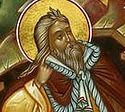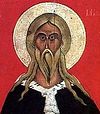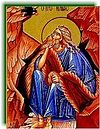

| Previous day | Next day |
| Old Style
July 20
|
Sunday |
New Style
August 2
|
| 8th Sunday after Pentecost. Tone 7. | No fast.
|
![]() Holy and Glorious Prophet Elias (Elijah) (9th c. b.c.).
Holy and Glorious Prophet Elias (Elijah) (9th c. b.c.).
St. Abramius of Galich, or Chukhloma Lake, disciple of St. Sergius of Radonezh (1375). Uncovering of the relics of Hieromartyr Athanasius, abbot, of Brest-Litovsk (1649). Sts. Savva (1392) and Leontius (late 14th c.), disciples of St. Sergius of Radonezh.
New Martyrs Lydia and soldiers Alexei and Cyril, near Ufa (1928). New Hieromartyrs Archimandrite Tikhon (Krechkov), hieromonks George (Pozharov) and Cosmas (Vyaznikov), and priests John Steblin-Kamensky, Sergius Gortinsky, Theodore Yakovlev, Alexander Arkhangelsky, and George Nikitin, and with them Martyrs Euthymius Grebenshchikov and Peter Vyaznikov, at Voronezh (1930). New Hieromartyr Alexis Znamensky, archpriest, of Vinogradovo (Moscow) (1938).
Righteous Aaron the High Priest, brother of Prophet Moses the God-seer (ca. 1530 b.c.). Sts. Elias, patriarch of Jerusalem (518), and Flavian, patriarch of Antioch (512), confessors. St. Ethelwida, widow of King Alfred the Great (9th c.). Martyr Salome of Jerusalem and Kartli, who suffered under the Persians (13th c.). St. Elias (Chavchavadze) of Georgia (1907). St. Alexis Medvedkov, archpriest, of Ugine, France (1934). Sts. Elias Fondaminsky (1942), Priest Demetrius Klepinine (1944), George Skobtsov (1944), and Nun Maria (Skobtsova) (1945), of Paris.
Repose of Priest Valentine Amphiteatrov of Moscow (1908) and Schemanun Sarah of Borodino (1908).
Thoughts for Each Day of the Year
According to the Daily Church Readings from the Word of God
By St. Theophan the Recluse

Eighth Sunday After Pentacost. [I Cor. 1:10-18; Matt. 14:14-22]
Before the miraculous filling of the five thousand people, the disciples of the Lord wanted the people to be sent away; but the Lord said to them: They need not depart; give ye them to eat. Let us learn this word, and each time the enemy suggests to us to refuse someone who asks for something, let us say from the face of the Lord: “They need not depart, give ye them to eat”—and let us give whatever we find at hand. The enemy destroys the desire to offer charity, and suggests that maybe the asker is not worthy of being given to; but the Lord did not investigate the worthiness of those sitting there: he served everyone equally, while of course, not everyone was equally devoted to Him; perhaps there were even those who later cried: “crucify him.” Such is God’s overall providence toward us: He maketh His sun to rise on the evil and on the good, and sendeth rain on the just and on the unjust (Matt. 5:45). If only the Lord would help us even a tiny bit to be merciful, as our heavenly Father is merciful (Luke 6:36).
Articles
 The Holy Prophet EliasA man who saw God, a wonderworker and zealot for faith in God, Elias was of the tribe of Aaron, from the city of Tishba, whence he was known as "the Tishbite." |








